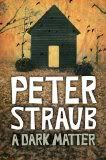Tuesday, 22 June 2010
Book (Fiction) - A Dark Matter, Peter Straub.
 |
| Buy On Amazon UK |
Peter Straub writes about a ritual in a meadow one evening in the 60s, during which four high school friends share a different perspective on the same occult happening that affects them deeply for the rest of their lives. Years later, the husband of one of the participants, Lee Harwood, decides to piece together those same events from the viewpoints of the parties concerned. In fact, Harwood belonged to that same high school bunch, but failed to be drawn by the instigator of their apocalyptic experience, ageing campus guru Spencer Mallon. He has always wondered about that day, knowing the others have a bond as a result that he isn't privy to, but also aware that were some dire consequences, resulting in the death of one of their number and lifelong internment in a mental facility for another. This subliminal questing is brought into focus, years later, by an encounter with a raving man in a diner, who reminds him of the one who didn't fare too well from his experience.
The principal characters have no weaknesses of construction, they are as whole and hale as he crafts them. As always with Straub, less is generally more, except perhaps in the case of Spencer Mallon, that purveyor of cod philosophy - "everything is everything", and shabby necromancy. His Svengali-like hold over the impressionable students does not invite unbelief, but his later propensity to dally through layers of time and space at will, concocting Lost type challenges for hapless followers in search of truths does, a little. Mallon, in the way of superhero villains, is over-powered, threatening the credibility of the otherwise elaborate small-townness of Straub's world.
Straub, it seems, became conscious of this, and also the need to allow the intended viewpoints (of the now-grown students) to flower and so prunes back Mallon's latter-day character, confining him largely to hints and half-glimpses and reported speech, with one physical airport appearance (to warn Harwood of an impending disaster).
But this clunky watering down leaves the unlikeable Mallon stranded two-dimensionally in the current world. Brimming with inarguable potency, yet too far removed from the consequences of the story. It's a tricky balance that Straub marginally struggles with in the late stage pregnancy of the story's often painful birth.
So the narrative works best when these grown-up folk struggle to reconcile what happened to them that long-ago day, encouraged by Lee Harwell's gentle probing. Having said that, this isn't a leap out, scream-in-the-dark horror parable in the way of King or Herbert. Straub doesn't write that way, he builds a sense of strangeness in the inanimate, almost inviting you to wander through scenes of the everyday and point out things that mightn't look quite right. That mightn't be what they seem. All without judgement or inference, and with that shrewd air of "we're just going here, to take a look. Come along if you want."
Unusually though, for someone so effortless in the art of story, the first fifty pages were fairly hard going, as though the author had struggled through several drafts to try and make his world stick, and had deemed this the best it was going to get. After that, though, Straub's laconic style soon kicks into stride, economy and turn of phrase dictating a smoothly deceptive pace and level of engagement common to all his works.
In summary, this isn't his absolute best. It falters at times and wanders into areas of dislocation at others, but it still offers that same sleepy warmth of a long, disturbing daydream in a summer meadow.
Rating: 3 stars out of 5
Subscribe to:
Post Comments (Atom)
Amazon Search
Blog Archive
-
▼
2010
(8)
-
▼
June
(8)
- Book (Fiction) - A Dark Matter, Peter Straub.
- Book (Fiction) - A Life of Pi. Yann Martel
- Game - Red Dead Redemption. Rockstar Games.
- Play - When Harry Met Sally - Opera House, Manches...
- TV - White Girl (2009)
- Play - A Midsummer Night's Dream - Octagon Theatre...
- Book (Poetry) - The World's Wife. Carol Ann Duffy.
- Book (Fiction) - A Kind of Intimacy, Jenn Ashworth.
-
▼
June
(8)
About Me

- Tony Foster
- Manchester, England, United Kingdom
- Writer, Father, student, career procrastinator.




0 comments:
Post a Comment